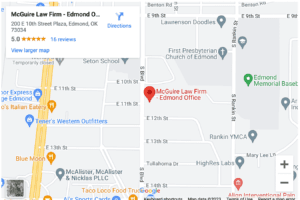What Does Oklahoma Workers’ Compensation Insurance Cover?

Oklahoma mandates that all employers, with a few exceptions, purchase workers’ compensation insurance. This program guarantees that every employee injured while working for these employers will receive basic benefits until they return to work.
The tradeoff is that injured employees covered by workers’ compensation cannot sue their employers for their injuries. In some situations, third parties — like manufacturers of defective safety equipment — might bear liability for on-the-job injuries resulting from workplace accidents they caused.
But workers’ comp provides the exclusive remedy for workers injured on the job regarding their employers.
Here is an overview of what Oklahoma workers’ compensation insurance covers.
Workers Covered by Oklahoma Workers’ Comp

Oklahoma law exempts very few employers from its workers’ compensation mandate. Some employers exempted from Oklahoma’s workers’ comp insurance mandate include:
- Railroads
- Certain agricultural businesses
- Real estate brokerages that pay a commission
- Family businesses with five or fewer employees, all related to the employer
- Tax-exempt youth sports leagues
- Sole proprietors with no employees
- Partnerships with members and no employees
- Limited liability companies with members and no employees
- Volunteer organizations
- Owner-operators of a truck-tractor
These employers have the option to buy or decline workers’ comp insurance. All other employers must buy workers’ comp insurance. These employers have two options for buying workers’ comp policies.
They can buy a policy from a private insurer. In Oklahoma, Berkshire Hathaway, Employers, and The Hartford are among the largest private workers’ comp insurers.
Employers can also buy a policy from Oklahoma’s state-funded workers’ comp insurer. This entity has a large pool of policyholders, so it can offer competitive rates compared to private insurers. For small businesses, Oklahoma’s state entity can often beat the rates offered by private companies.
Accidents Covered by Oklahoma Workers’ Comp
Insurers agree to cover injuries arising from on-the-job accidents. This usually means that the accident happened during the course and scope of the employment. Several factors go into determining whether an injury happened in the course and scope of employment, including:
Where the Accident Happened
Workers ' comp probably covers the injuries if an accident happens at the employer’s location. Likewise, workers’ comp covers accidents at a remote site where you perform your job duties. For example, it can cover injuries to a home health provider in a patient’s home.
Insurance can also cover accidents on the road if driving was part of the injured employee’s job duties. However, workers’ comp will not cover commuting accidents or accidents while going to lunch.
But it will cover accidents that happen while the employee travels between job sites when that travel falls within the employee’s job duties. A delivery driver, for example, will probably get compensated for injuries suffered while on a delivery.
How the Accident Happened
Workers’ comp covers accidents that happen while you perform your job duties. The insurer will usually not cover accidents that happen during non-work activities. Some events that do not fall under workers’ comp include:
- Social or recreational activities sponsored by your employer
- Fights between employees
- Accidents that resulted from drug or alcohol use
Other accidents might only result in some, but not all, injured employees receiving workers’ comp benefits. For example, workers injured during horseplay will not get benefits unless they are innocent victims.
Injuries Covered by Oklahoma Workers’ Comp
Workers’ comp covers all injuries resulting from on-the-job accidents with a few limited exceptions, including:
Mental Injuries
Workers’ comp insurers will only pay benefits for mental or emotional injuries if the accident also caused physical injuries.
Pre-Existing Conditions
Workers’ comp will not pay for pre-existing injuries. But it will pay benefits if an on-the-job accident worsens an existing condition.
Thus, suppose that you have arthritis in your knee. If you tear the cartilage in your knee in a job-related accident, workers’ comp will pay benefits for the torn cartilage but not for arthritis.
Natural Degeneration
Workers’ comp does not cover injuries that relate to the natural degeneration of your musculoskeletal system. For example, if you have degenerative disc disease, workers’ comp will not cover your disc injury if it worsened naturally during your employment.
But workers’ comp will cover injuries related to repetitive motions or repetitive stress caused by your job duties. Thus, workers’ comp will cover injuries like carpal tunnel or stress fractures.
Benefits Provided Under Oklahoma Workers’ Comp
Oklahoma workers’ comp insurers pay 100% of the necessary medical expenses for your covered injuries. This includes examinations, surgery or other treatment, physical therapy, and medication.
Your employer gets to choose your treating physician. Usually, insurers contract with treatment providers, and you will select from the list of providers under contract.
Oklahoma insurers also pay temporary total disability (TTD) benefits in certain circumstances. TTD covers 70% of your wages up to the state maximum. The state adjusts the maximum benefit every year, so you must check with the insurer to determine your maximum benefit.
If you can still work but need to take alternate duty until you heal, you can receive temporary partial disability (TPD) benefits. These benefits make up at least some of the difference between your average normal wage and your wage for alternate duty.
If you suffer permanent disability from your injuries, you can earn partial or total permanent disability benefits. These benefits depend on your wage losses due to your disability. The insurer can pay these benefits as a lump sum rather than a weekly benefit to settle your claim.
For workers killed on the job, workers’ comp insurers must pay a death benefit of $100,000 plus a wage benefit of 70% of the worker’s wage. Again, the insurer can choose to pay the benefits in a lump sum rather than a weekly benefit.
Getting Your Oklahoma Workers’ Comp Benefits
Workers’ comp insurers, like all insurers, have an incentive to deny and reduce claims. Occasionally, insurers will take unreasonable positions, and you will need to seek redress from an administrative law judge.
Fighting for your benefits is often necessary to avoid financial catastrophe. Contact the expert attorneys at McGuire Law Firm to schedule a free consultation to discuss what Oklahoma workers’ compensation insurance will cover after your accident.

